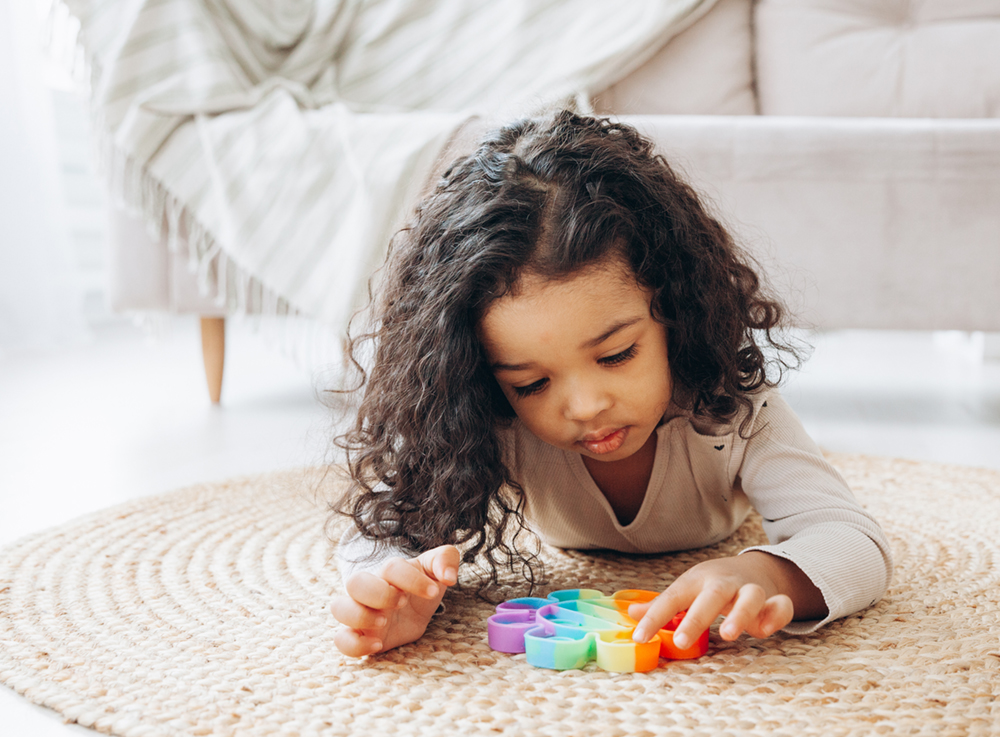
Supporting Play for Children with Autism
Written by: Rebecca Mohr
Like all children, kids with autism love to play! Autism spectrum disorder is a neurodevelopmental disorder that effects a person’s social and communication abilities and can cause restricted or repetitive behaviors. These differences in thinking and behaving may cause some children with autism to need support in play. Find more information about autism here.
Children with autism may have specific preferences for what toys they want to play with and how they want to play. Negotiating the social interactions and challenges of play with other kids may feel uncomfortable for some. Others may only want to engage with one toy or activity. Some children with autism might play with toys by making patterns, lining them up, or sorting them into categories which others may not understand.
As a spectrum disorder, not every child diagnosed with autism will have the same strengths or challenges with socializing and play. Children with autism are as diverse as children without autism! Even though not every child will need additional adult support, it is helpful to be aware of how a child’s autism might be expressed while playing. Here are a few things to consider for supporting a child with autism in their play.
Toys provide sensory input. Children with autism will often look to fill one of their five senses with objects in their environment:
- Touch: Toys that have interesting textures or bright colors can be exciting for some kids. For example, stuffed toys that are soft and animal figurines that are rough and bumpy. Pinscreens and fidget toys are examples of toys that offer touch.
- Visual: Children with autism might be drawn to toys with a lot of visual aspects. Toys that light up, are filled with water and sparkles, or have bright colors can be captivating and exciting. You can make your own glitter jars at home that are fun to make and fascinating to watch!
- Sound: Musical toys or toys that make sound effects can be exciting and fun for kids with autism. Children might dance or sway to music from a toy, squeeze a toy with a squeaker, or honk the horn on a toy car.
Just as some sensory experiences may be very exciting and fun for a child with autism, it is important to keep in mind that some sensory inputs can be frustrating or uncomfortable for some children. Loud noises may be bothersome. The feeling of sand between their toes in a sandbox might be irritating. Children with autism and their caregivers know what is liked and disliked when it comes to play, so it is important to pay attention to what is enjoyable to help children find the right play environment that fulfills their sensory needs.
Independent play
Playtime may be an independent activity for children with autism. While play time is important for teaching sharing and cooperation, independent play can provide a time to be creative and spontaneous outside of their structured day. Play can be used to learn and to make friends, and it is also important for children to have an unstructured time to make their own choices. Sometimes children might choose to play alone and that is okay!
If your child is playing cooperatively with a friend or sibling, praise this social behavior and tell them what you like about their interaction. Not all playtimes will look the same. Sometimes children can be encouraged to play with others and practice social skills. Other times they may want to be alone.
Specific interests
It is common for children with autism to have specific interests. For example, your child may have a focused interest in trains, planes, certain animals or bugs, video games, or story characters. Their conversation and play may be dominated by these interests, or they may refuse to play with any other types of toys. This behavior may be confusing to others who don’t understand their singular interest, but this passion can be an opportunity for a child to learn and take pride in their specific knowledge. Follow your child’s lead when playing with their preferred toys and ask them questions about the topic to show appreciation of how much effort they have put into learning about their favorite things. Asking your child to tell you about what they know can help you bond, and it shows them that you care.
More resources for Autism:
